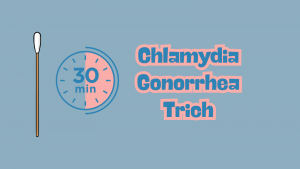Chlamydia
Site of initial infection:
- Throat
- Genital Area
- Urinary Tract
- Rectum
Symptoms: Often there are no symptoms. If there are symptoms, they might include a sore throat, abnormal discharge from the vagina, penis, or rectum, and/or a burning feeling when urinating.
Treatment: Easily cured with antibiotic medicines.
Gonorrhea
Site of initial infection:
- Throat
- Genital Area
- Urinary Tract
- Rectum
Symptoms: Often there are no symptoms. If there are symptoms, they might include a sore throat, abnormal discharge from the vagina, penis, or rectum, and/or a burning feeling when urinating.
Treatment: Can be cured with antibiotic medicines, but drug-resistant strains of gonorrhea are increasing in many parts of the world, including the US.
Syphilis
Site of initial infection:
- Mouth
- Lips
- Throat
- Genital Area
- Anus
- Rectum
Symptoms: Often there are no symptoms. In the first or primary stage of infection, may have a single sore or multiple sores on mouth, throat, genitals, or anus. In the second stage, may have a skin rash (often on the palms of the hands and the soles of the feet, but also on other body parts). The symptoms of syphilis will disappear with or without treatment, but without treatment, the infection remains in the body and may cause organ damage.
Treatment: Curable with antibiotic medicines.
Herpes
Site of initial infection:
- Lips
- Mouth
- Throat
- Genital Area
- Anus
- Rectum
- Buttocks
Symptoms: Often no noticeable symptoms. At times, blisters or sores are present on the mouth, lips, throat, genital area, anus, or buttocks.
Treatment: There is no cure for herpes, but medications can shorten and decrease or prevent outbreaks.
HPV
Site of initial infection:
- Mouth
- Throat
- Genital Area
- Anus
- Rectum
Symptoms: Often there are no symptoms, although some types of HPV can cause genital warts—small bumps in and around the genitals and anus, or in the mouth or throat. Others types of HPV can develop into cancer of the mouth, throat, cervix, or rectum.
Treatment: There is no cure for HPV infection, but 90% of persons clear the infection within 2 years. Genital warts can be removed through different methods, including freezing. Appropriate follow-up and treatment for genital and rectal HPV infections (detected by abnormal Pap smear and/or HPV test results) is essential for cancer prevention and detection.
HIV
Site of initial infection:
- Mouth
- Genital Area
- Anus
- Rectum
Symptoms: Often there are no initial symptoms; however, after first being infected some people experience flu-like symptoms. HIV damages the body by destroying specific blood cells that help the body fight disease. HIV infection can lead to acquired immune deficiency syndrome (AIDS).
Treatment: There is no cure for HIV or AIDS, although anti-HIV medications can slow the progression of HIV infection and can help keep an HIV-infected person healthy.
Note: Certain things have been suggested to increase a person’s chances of getting HIV during oral sex, if exposed to an infected partner, such as having poor oral health, having bleeding gums or gum disease, having sores in the mouth or on the genitals, or being exposed to the “pre-cum” or “cum” (also known as pre-ejaculate or ejaculate) of an infected partner. However, no scientific studies have been done to show whether or not these factors actually do increase the risk of getting HIV or STI from oral sex.








